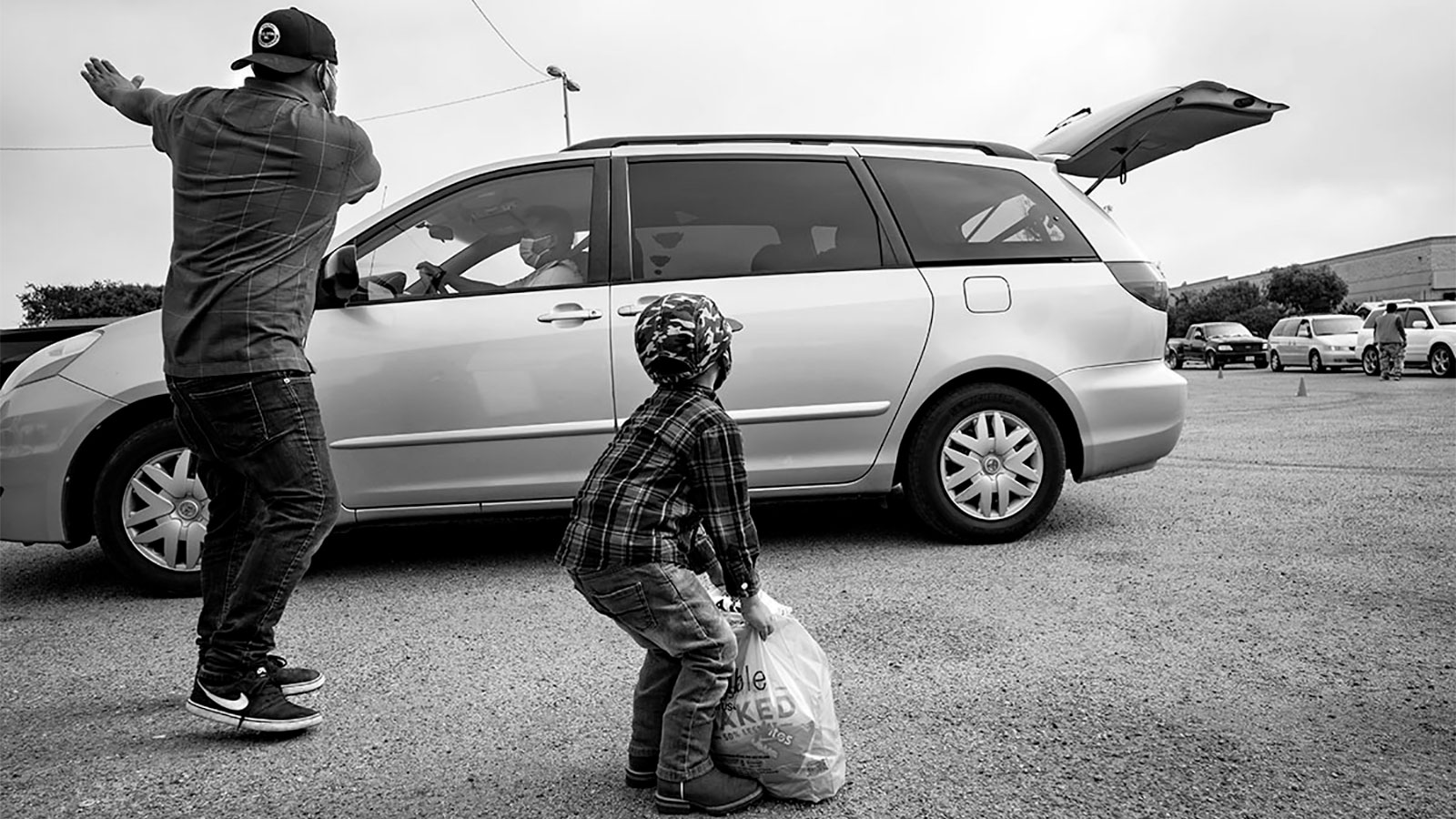Out of the corner of my eye, I caught a glimpse of tiny 3-year-old Yair Basurto shuffling back and forth between a pile of grocery bags and a long line of cars waiting with open trunks. He and his father, Gonzalo, were loading food deliveries for farmworkers and other families in need in the parking lot of a Masonic temple in the coastal agricultural community of Oxnard, California.
The snack bags were just one small part of the aid distributed that day in September. Every month since April, a local collective of Oxnard farmworkers called “De Campesinxs a Campesinxs (From Farmworkers to Farmworkers): Feeding those who feed us” has provided food, clothing, and school supplies to hundreds of farmworkers and families suffering during the COVID-19 pandemic. In September, families waited in their cars for hours to receive the donations, so the volunteers scrambled to hand them plates of hot quesadillas, brown bags with masks and instructions on pandemic safety, and most importantly, the food: boxes filled with frozen chicken and pork, cheese, other basic staples, as well as the snack bags.
Yair, taking cues from his father, who was directing traffic, seemed to sense the urgency. With a burst of energy that belied his small stature, the boy hoisted each packed grocery bag into his tiny arms and rushed to deposit the treats into the recipient’s trunk, accepting help from his father as necessary.
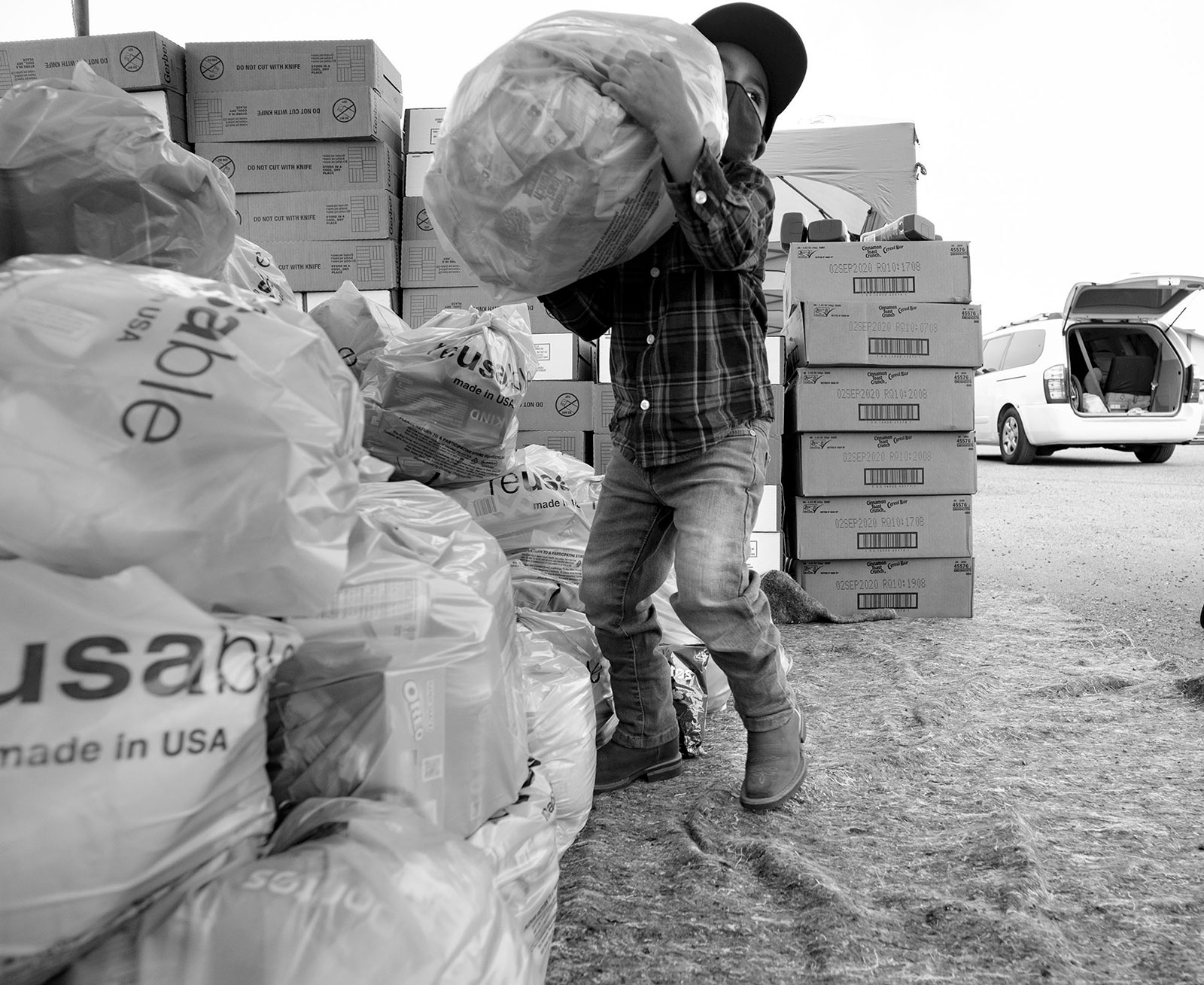
Yair Basurto, 3, hoists a food donation bag to be placed in the trunk of a car in Oxnard, California. Photograph by Daniel A. Anderson
Throughout the fall, I returned to Oxnard to observe this operation, and I discovered that the project was about much more than handing out sustenance. For the children of the farmworker volunteers, every food delivery gave them a chance to see love in action: what it’s like for a community to come together, and for strangers to be generous — not just with their time and their effort, but with their attitude toward those in need. Every day these children experience the harsh realities of going without, even as their parents go to work to feed America while risking exposing themselves to COVID-19. It can be far too easy to forget these faces every time we retreat into our own worlds: the poverty hidden in plain sight along paths we don’t walk.
When I first met Carmen Obeso in September, food insecurity and a frayed social safety net had left many families stretching to make ends meet. Obeso, a farmworker, helps oversee the De Campesinxs a Campesinxs project, which has also been spearheaded by the Oxnard-based farmworker network Lideres Campesinas and Alianza Nacional de Campesinas, a national alliance of farmworker women. Many Oxnard farmworkers had lost jobs, were working fewer hours, or were unable to work due to outbreaks of COVID-19 in their communities. Obeso was working nonstop: traveling with fellow farmworkers to Los Angeles to pick up donations, crafting Instagram and Facebook announcements to alert families to the giveaways, and coordinating food deliveries for farmworkers quarantined at home or in motels.
“There’s no end to this work,” Obeso told me while working the September food giveaway with her 7-year-old son, Ever, at her side. She described the tension many families were living with daily out of fear they’d get exposed to COVID-19 and lose work as a result. At the top of their list of worries was not having enough food to feed their children.
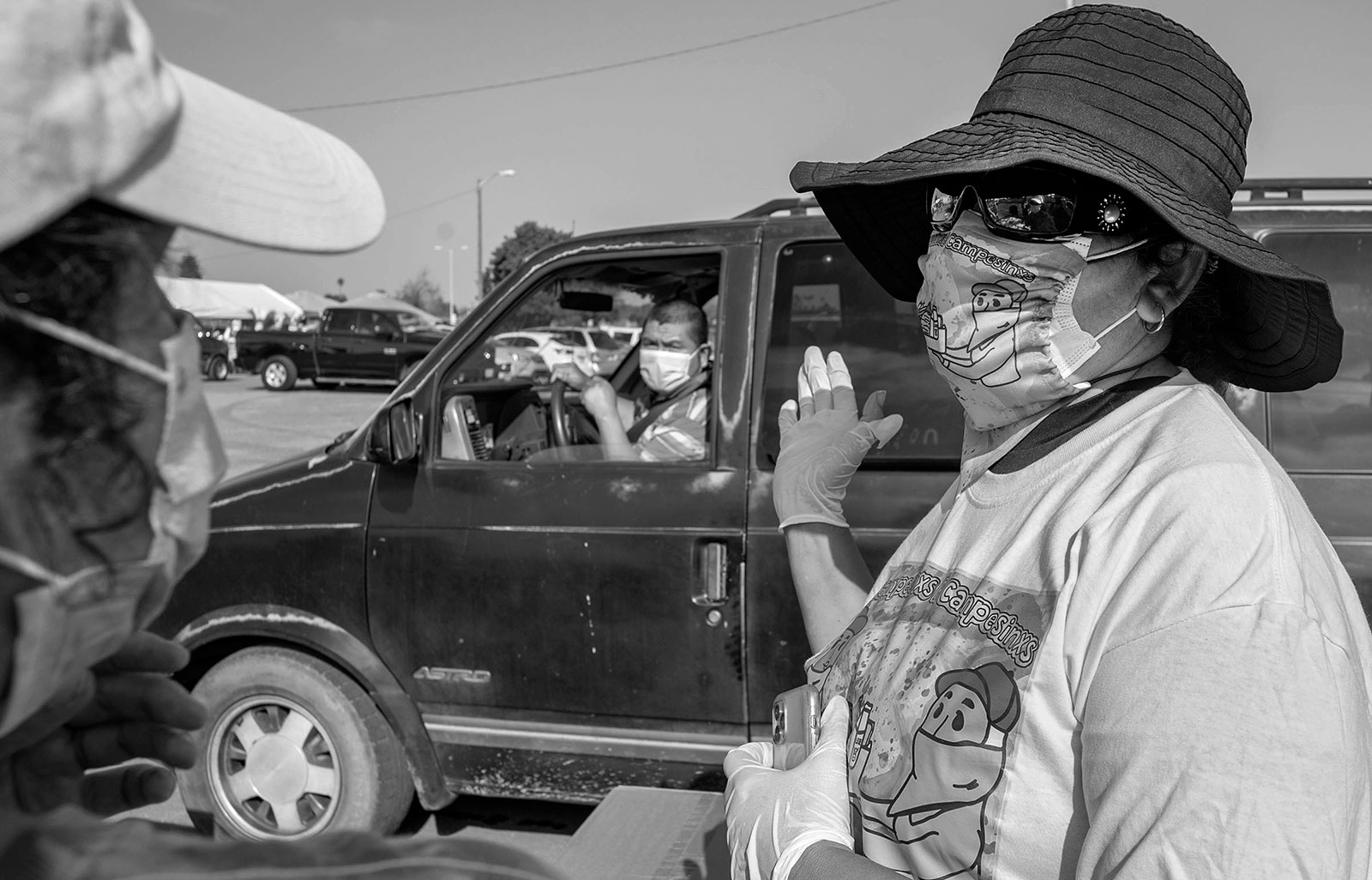
Carmen Obeso, right, answers questions from families gathered to participate in a food relief program for farmworkers. Photograph by Daniel A. Anderson
When the COVID-19 pandemic triggered a statewide shutdown in California, Josefina Viterbo was forced to leave her job as a farmworker in Oxnard to care for her five children, who range from age 9 to just 10 months old. Her husband continued working as a strawberry picker, but surviving on his income alone left the family in extreme need. In late September, Viterbo stood patiently in line with her five children, seeking help for the first time during a special giveaway that Obeso organized exclusively for farmworkers.
“One way or another, we can gather food via donations, but it’s very hard to find clothing donations for the children,” Viterbo told Grist in Spanish after she finished collecting a blanket, a jacket, and a box of diapers. With cold weather approaching, her biggest worry that day was finding winter clothing for the kids. The families were free to choose whatever items they needed from tables full of household necessities, and each was also offered one pair of headphones meant to aid school-age children who were suddenly learning from home. “Right now, thank god, so many people are helping and we’re getting by,” said Viterbo.
By early December, Obeso reported that the situation had grown dire. Food banks, pantries, churches, and other charitable organizations were stretched thin responding to an ever growing-population in need. “People are desperate for help because there’s no work,” said Obeso, a single mother of two young sons. She knows exactly what her fellow farmworkers are facing, because she checks in with every family she registers at each event.
Sitting in an idling car as he waited in line for the September giveaway, one father told Obeso that his three children were learning from home alone while he and his wife worked in the fields. “There’s no other option,” he told Obeso in Spanish. Another father confessed that the long-distance learning was a struggle because of the shaky internet connection at his house. Obeso always asks registrants what they do for a living. “Freseros?” she asked one couple, trying to put them at ease by asking if they were strawberry pickers. When they shyly nodded yes, she followed up by asking how many crates they pick per day. She quickly sized up the husband. “I’m going to guess you pick 60 boxes!” she declared, eliciting a laugh from the couple. If anyone understands their plight, it’s Obeso.
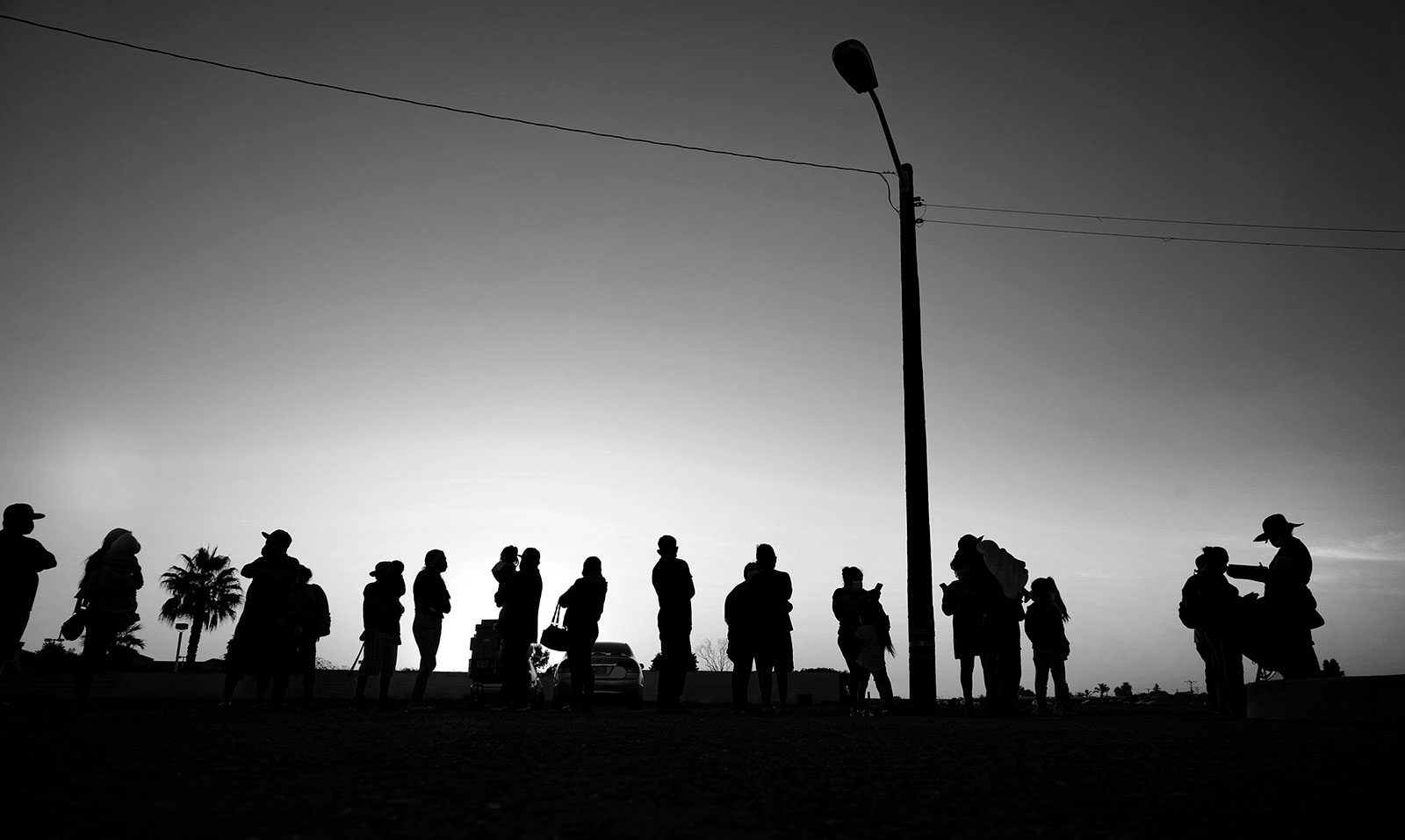
Carmen Obeso, far right, registers families waiting for donations of clothing and other necessities. Photograph by Daniel A. Anderson
2020 was a year filled with strife, loss, and pain for many Americans, but especially for farmworkers across California. A study examining conditions among California farmworkers during the pandemic, published by the California Institute for Rural Studies this summer, found that these workers have not only lost work and wages, but they also lack access to health care and public assistance programs. Some farmworkers lost 40 percent of their work from April to June, that study found. Another study from the University of California, Los Angeles, shows that deaths among working Latinos have quintupled since May, in large part because Latinos constitute such a large portion of the state’s essential workers, from farmworkers to truck drivers to meat and vegetable packers. “COVID-19-associated deaths are burning their way through the entire Latino working-age population,” the study concluded.
Obeso has worked as a farmworker in the United States for a decade now, but the 44-year-old’s work experience stretches back to her childhood, when she began picking grapes at the age of 13 in her native Mexico during school year breaks. She’s long been aware of the risks that farmworkers face due to pesticide exposure and other occupational threats. Those risks have never felt as acute as they do this year, as Oxnard farmworkers watch their coworkers succumb to COVID-19 within weeks of exposure.
Obeso feels these losses at her core, because she’s lived daily with the fear of leaving her two sons motherless. It’s what drives her to make sure that any farmworker suffering from COVID-19 receives assistance. During the summer, when quarantined farmworkers asked for snacks like pan dulce, she and the other volunteers delivered the Mexican sweet bread. When her neighbors came down with COVID-19, Obeso made regular food deliveries and helped connect them to resources to make ends meet while they were quarantined.
“The only one who helped was Carmen,” said one farmworker, whose wife works in the fields and contracted COVID-19 this summer. Obeso personally delivered food to the quarantined couple three times, the man told Grist in Spanish. (He declined to provide his real name out of fear he’d be targeted by his employer for speaking out about working conditions.) “When you’re in a tough spot, a situation like that, it gives you joy when you see her coming,” he said as he waited in the parking lot of Art Haycox Elementary School in Oxnard, where Obeso had organized a giveaway. (At Haycox, which serves a neighborhood where many farmworkers live, a majority of families have incomes that fall below the federal poverty line.) The farmworker had shown up that day to give back by volunteering to distribute food. When the truck loaded with food boxes arrived early in the evening, he jumped in to help unload the boxes.
At this point, the line of people was so long that it wound through the entire parking lot of the school. But those waiting, primarily mothers, sat patiently next to orange cones that Obeso had placed six feet apart to keep everyone socially distanced. Ever, meanwhile, did his part by handing out peanut butter and jelly sandwiches to the kids and their parents as the line inched forward. “Keep your distance,” Obeso reminded everyone as they approached the truck for their food boxes, which were filled with milk, eggs, potatoes, roast chicken, butter, green apples, yellow onions, and other staples. Many approached cautiously, smiling shyly but gratefully as they loaded the food into baby strollers or personal shopping carts. “Don’t be scared, don’t be scared,” one of the volunteers assured a mom who approached apprehensively.
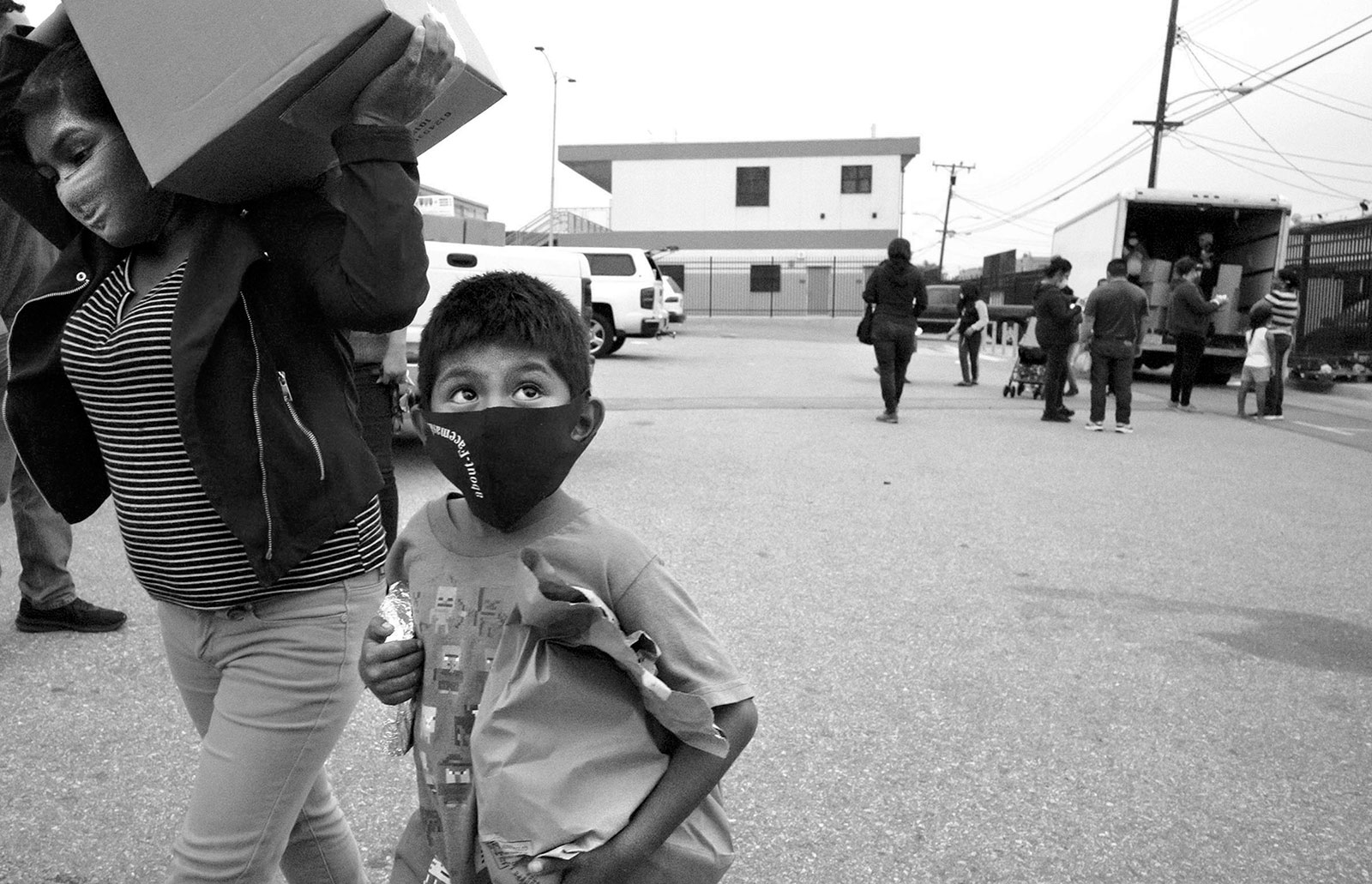
A young boy departs the parking lot of Haycox Elementary School in Oxnard, California. Photograph by Daniel A. Anderson
Jaime Perez, who works for the nonprofit Coalition for Family Harmony, which helps domestic violence and sexual assault survivors, was also there that day to deliver a food box for a quarantined family in nearby Fillmore. Obeso, he said, had helped the family four times. In fact, she’d provided food for about 15 families he worked with, many of whom were struggling to pay rent. Afterward, Perez told me that the Fillmore family was especially grateful for the food delivery because they didn’t have any money to buy groceries that week. That Perez was going to brave rush-hour traffic to deliver the food about 30 miles away spoke to the acute need facing these families, but it was something that he did because the farmworkers had already put so much on the line. “The economy of our country is rooted in our farmworkers,” he said in Spanish.
You wouldn’t think that from listening to the outgoing U.S. president, who spent years denigrating immigrants with both his personal language and his administration’s policies. But in the strawberry fields of Oxnard where farmworkers toil, in the neighborhoods where residents deliver each other meals, and in the parking lots where farmworkers lend each other a hand during these difficult times, the real story of America is unfolding.
On a chilly Sunday morning in December, Obeso was back at the Masonic temple, working to raise the tarps that will shelter the volunteers as they distribute donations later that afternoon for another food giveaway. Earlier that morning, Obeso’s 14-year-old son Alexis helped load her truck with donations, then stayed home to study. Ever trailed alongside Obeso to the grocery store, as always. They bought radishes, cilantro, and sour cream for flautas to serve to the farmworkers and turkey pozole to give to the volunteers. By this time, Ever knew the set-up drill and began helping the adults tie tarps to a metal frame for the tents.
“Can you do it?” Obeso asked as she peered down at her son, struggling to secure the rope to the tarp. Ever nodded, and a few seconds later Obeso cheered him on, chanting “sí se puede” as he completed the knot. He sprang up and jumped with joy. “You can do it. Yay!” he shouted to himself. Working in unison, the volunteers then raised the tarp roof and moved it across to the corner of the parking lot, wrapping up as music from the adjacent church, hosting an outdoor Sunday service, filled the air. At the entrance to the Masonic Temple, a small group of homeless people shivered as they watched the volunteers finish setting up the tarps. They too would be free to receive food that day, as De Campesinxs a Campesinxs opens the monthly giveaways to anyone in need. These are difficult times, but as rough as they are, there is still hope for those who need assistance, thanks to the generosity of strangers helping strangers.
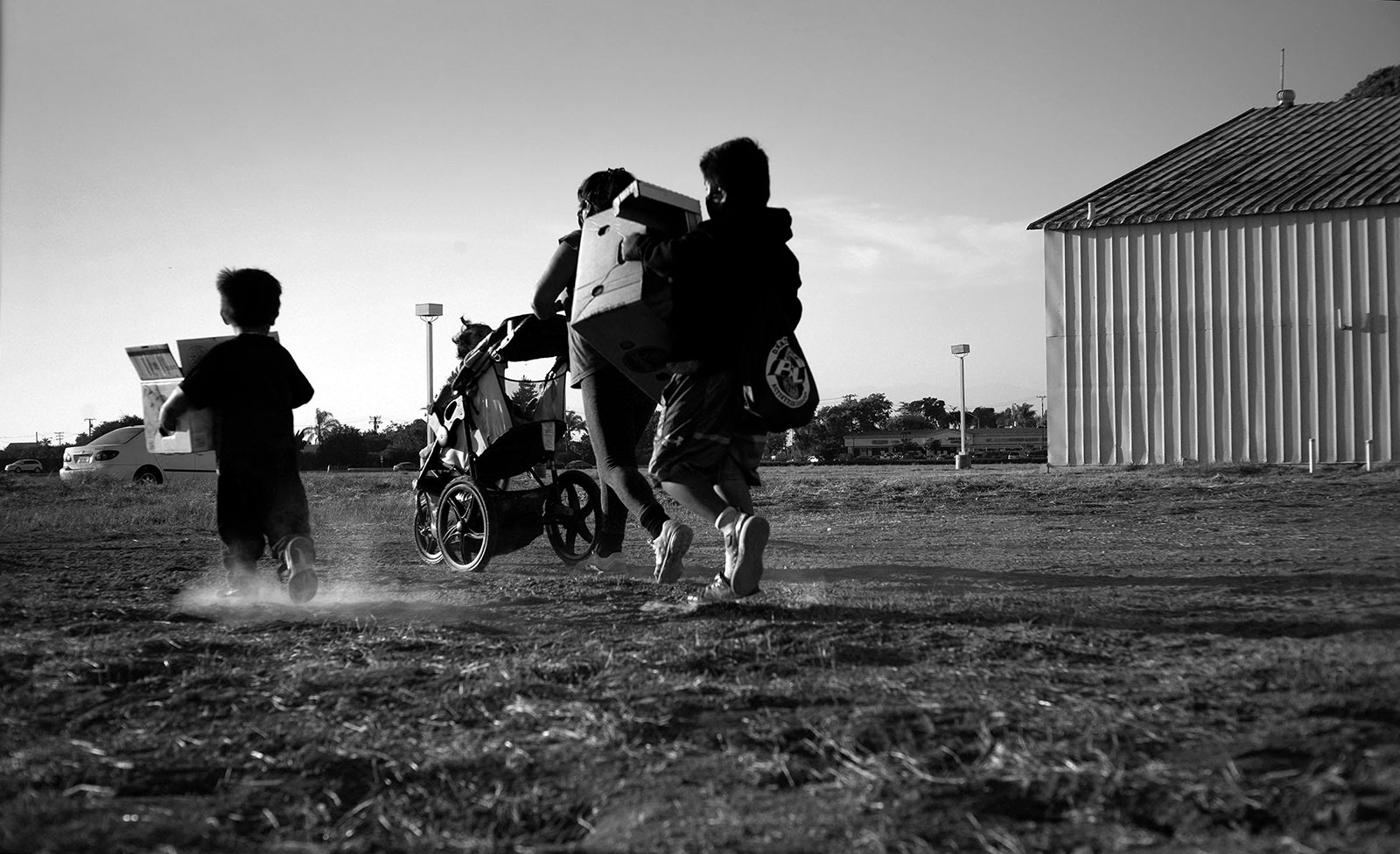
A family crosses a field after picking up donated food and other items. Photograph by Daniel A. Anderson
As I prepared to leave, I saw a smattering of hand-drawn hearts on the dust covering the rear window of Obeso’s truck, along with a single handprint that appeared to be the size of Ever’s hand. I asked him if it was his, and he nodded sheepishly. It was just a few weeks before Christmas, so I asked Ever what he wanted for his mom for Christmas. Two things, he told me: “some shoes and some love, because I want her to be happy.”
In the end, this 7-year-old gets to the heart of what truly matters as we travel together on life’s journey: All we really need is a strong pair of shoes and some love to make it in this world. I asked Ever one final question about what it means to him to be able to help families in need. “It feels really good to help them, and for them to have food,” he replied. “If they have no money or food they can come over here, and they can feel happy.”

